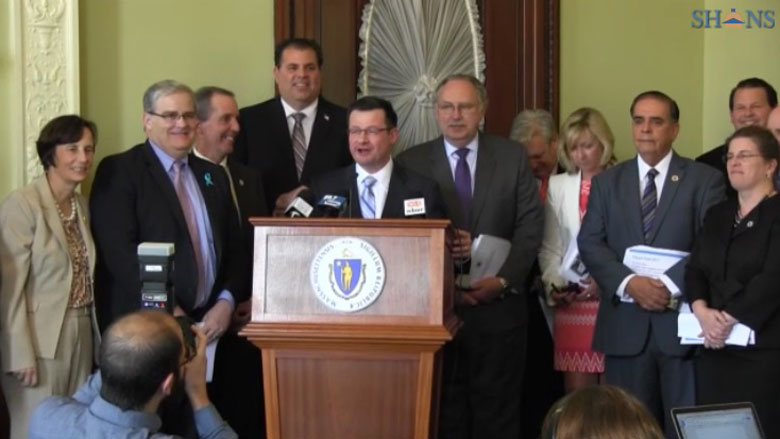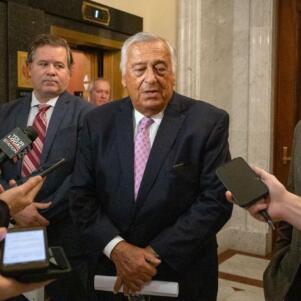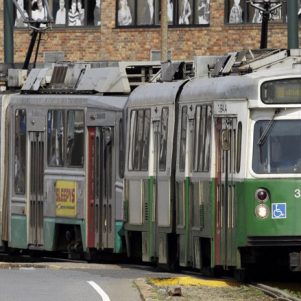Court predicts layoffs, enviro groups also knock House budget
By State House News Service | April 14, 2016, 6:33 EDT
 House W&M Chair Rep. Dempsey outlines House budget [Video: Antonio Caban/SHNS]
House W&M Chair Rep. Dempsey outlines House budget [Video: Antonio Caban/SHNS] STATE HOUSE — Cities and towns reliant on local aid saw much to celebrate in the $39.5 billion budget proposal released by House leadership on Wednesday, but some groups, including the court system, were less excited by the fiscal restraint shown in the spending plan for next year.
The budget, which marks the sixth produced by House Ways and Means Chairman Brian Dempsey, limits spending growth to well under the 4.3 percent projected growth in state revenues next year as health care, pensions and debt payments continue to consume large portions of the $1.34 billion in proposed new spending.
Dempsey said the proposal, which carried a bottom line $76 million lower than Gov. Charlie Baker’s recommendations, would increase spending on local aid by $159 million next year, including a 2.3 percent boost in Chapter 70 aid for local school districts. The school aid would exceed Baker’s recommendation by $33.7 million.
“This resonates with the speaker’s and the chairman’s long-standing priority to have a strong fiscal partnership with cities and towns,” said Massachusetts Municipal Association Executive Director Geoff Beckwith.
In addition to the Chapter 70 aid, the House budget proposal funds special education at $5 million above Baker’s budget filed in January. The House bill increases regional school transportation by $1 million and allocates $5 million extra for charter school reimbursements, compared to this fiscal year.
Asked where the proposed budget found the savings to both increase local aid and come in under the governor’s proposal, Dempsey said the Ways and Means plans allocates less than Baker for public defenders and emergency shelter services. The Haverhill Democrat described both as caseload driven accounts that typically require additional funding throughout the year and are best managed as the need arises.
Rep. Josh Cutler, who helped spearhead a letter from lawmakers to budget writers asking for at least $20 million in local school aid above the governor’s request, called the budget a “huge win” for school districts.
“We were hoping for a modest increase in the formula, but this is far better than ever expected,” he said.
However, House leadership’s focus on controlling spending, limiting the use of the one-time revenues and bolstering the state’s reserves left some areas of government wanting for more.
Supreme Judicial Court Chief Justice Ralph Gants, in a statement with the chief justice and administrator of the Trial Court, said the House budget, as written, falls more than $17.3 million short of what is required to maintain services and would force approximately 300 layoffs in the courts.
“In recent years, with the support of the Legislature, the Trial Court has made significant strides in modernizing and streamlining its operations. The reduction proposed in the House Ways and Means Budget would seriously impede the ongoing modernization of the judicial branch and reduce the Trial Court’s ability to effectively respond in a timely manner to society’s need for justice. We in the judiciary believe that this is not the time to curtail the timely delivery of justice to the residents of the Commonwealth,” the court officials wrote.
Environmental advocates also criticized the level of funding in the Ways and Means proposal for environmental protection agencies. The Environmental League of Massachusetts said spending in the House budget plan would be reduced by 7 percent from fiscal 2016 levels.
“Over time, DEP and DCR have been disproportionately cut, with staffing down 30% since 2008, while at the same time they have been asked to do more to fight climate change and protect our natural resources. You cannot do more with less,” the group said in its analysis.
House Republicans were generally pleased with the framework of the budget, including the increase in local aid for cities and towns to raise per pupil spending to $55. “We like that number a lot,” said Rep. Todd Smola, the ranking Republican on the Ways and Means Committee.
House Minority Leader Brad Jones, of North Reading, also applauded the lack of new revenue proposals in the budget.
“I am especially pleased to see that the budget holds the line on taxes and acknowledges the Governor’s call for fiscal responsibility by significantly reducing the state’s reliance on one-time revenues to balance the budget,” Jones said.
Setting up the House to begin its debate on the budget a week from Monday, the House on Wednesday adopted an order setting a deadline of 5 p.m. on Friday to file amendments. Democrats beat back Republican attempts to amendment the order that would have given lawmakers more time – until Tuesday evening – to review the bill and file amendments.
The House also rejected along a party line vote a proposal offered by Jones to raise the threshold from a simple majority to a two-thirds vote on so-called “inoculator” amendments that are often used by the majority party to refer proposals offered by GOP lawmakers for further study, thereby avoiding a vote on the underlying issue.
Two other amendments were put forward by Republican Rep. Kevin Kuros to give lawmakers at least two hours to review consolidated amendments, which are groups of amendments clustered by House leaders by category to save time that require only a single vote, and to prevent the consolidating of consolidated amendments. Both were rejected.
Paul Craney, executive director of the Massachusetts Fiscal Alliance, urged House leaders to resist adding to the budget’s bottom line with earmarks and to have a more open debate, and not the “closed-door horse trading sessions” that result in consolidated amendments.
“Checking the growth of state spending is a big priority for our members,” Craney said, adding, “Rank-and-file legislators must now do their part and refrain from loading the budget up with pet projects.”
While the Democrat-controlled House followed Baker’s lead, in many respects, to limit new spending and wean the budget off its reliance on one-time revenues, the liberal-leaning Massachusetts Budget and Policy Center faulted the budget’s lack of ambition in tackling problems such as college affordability.
“On the bigger picture, it doesn’t really take on the big challenges like trying to make public higher education more affordable for families in Massachusetts or fixing our roads and bridges and public transit systems, and taking on those challenges is difficult. It would require new revenue. And as long as our state tax system is structured so that our highest income resident pay less of their income in taxes than everybody else it’s hard to raise the revenue,” said Noah Berger, the MassBudget president.
Overall, the House proposal increases funding for higher education by about 1 percent, in line with Gov. Baker’s recommendations.
“We appreciate the $508 million funding proposal put forward by the House Ways and Means Committee,” UMass President Marty Meehan said in a statement. “UMass educates 73,000 students across the Commonwealth and is vital to our social and economic future. The support we receive from the state allows us to keep educational excellence and the dream of a better future within reach.”
— Written by Matt Murphy
Copyright State House News Service










